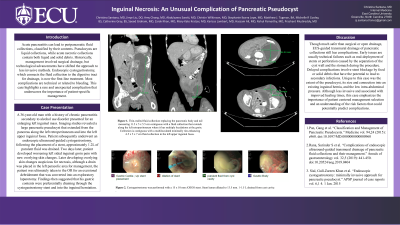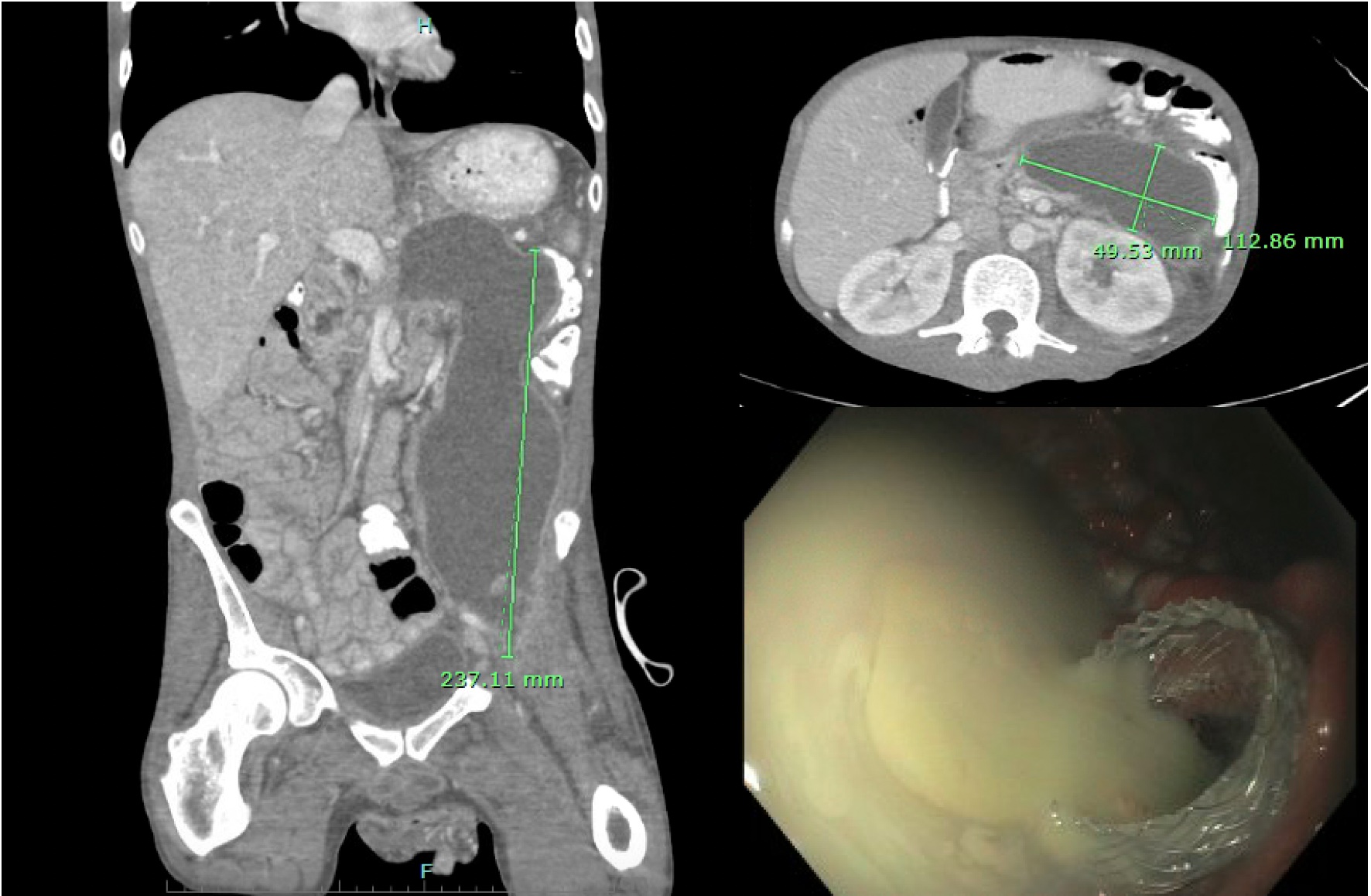Monday Poster Session
Category: Biliary/Pancreas
P1814 - Inguinal Necrosis: An Unusual Complication of Pancreatic Pseudocyst
Monday, October 28, 2024
10:30 AM - 4:00 PM ET
Location: Exhibit Hall E

Has Audio
- CS
Christina J. Santana, MD
East Carolina University Medical Center
Greenville, NC
Presenting Author(s)
Christina J. Santana, MD1, Jinye Liu, DO1, Amy Chang, MD1, Abdulazeez Swaiti, MD2, Christin Wilkinson, MD2, Stephanie Ibarra Lepe, MD1, Matthew Tugman, BA3, Michelle Cooley, BS3, Catherine Gray, BS3, Saeed Graham, MD2, Zarak Khan, MD4, MaryKate Kratzer, MD1, Karissa Lambert, MD4, Hassam Ali, MD2, Rahul Pamarthy, MD2, Prashant Mudireddy, MD4
1East Carolina University Medical Center, Greenville, NC; 2East Carolina University, Greenville, NC; 3East Carolina University Brody School of Medicine, Greenville, NC; 4East Carolina Gastroenterology, Greenville, NC
Introduction: Acute pancreatitis can lead to peripancreatic fluid collections, classified by their contents. Pseudocysts are liquid collections, while acute necrotic collections contain both liquid and solid debris. Historically, management involved surgical drainage, but technological advancements have shifted the approach to less invasive methods. Endoscopic cystogastrostomy, which connects the fluid collection to the digestive tract for drainage, is now the first-line treatment. Most complications are technical or related to bleeding. This case highlights a rare and unexpected complication that underscores the importance of patient-specific management.
Case Description/Methods: A 36-year-old man with a history of chronic pancreatitis secondary to alcohol use disorder presented for an enlarging left inguinal mass. Imaging studies revealed a large pancreatic pseudocyst that extended from the pancreas along the left retroperitoneum and into the left upper inguinal fossa. Patient subsequently underwent an endoscopic ultrasound-guided cystogastrostomy, following the placement of a stent, approximately 1.2 liters of purulent fluid was drained. Two days later, patient developed worsening left sided inguinal groin pain with new overlying skin changes. Later developing overlying skin changes suspicious for necrosis, although a drain was placed in the left paracolic area for management, the patient was ultimately taken to the OR for an excisional debridement that was converted into an exploratory laparotomy. Findings then suggested that his gastric contents were preferentially draining through the cystogastrostomy stent and into the inguinal herniation.
Discussion: Though much safer than surgical or open drainage, EUS-guided transmural drainage of pancreatic collections still has complications. Early issues are usually technical failures such as mal-deployment of stents or perforation caused by the separation of the cyst wall and the stomach during the procedure. Delayed complications involve stent blockage by food or solid debris that have the potential to lead to secondary infections. Unique to this case was the extent of the pseudocyst, its size and connection into an existing inguinal hernia, and the low intra-abdominal pressure. Although less invasive and associated with improved healing times, this case emphasizes the importance of patient centered management selection and an understanding of the risk factors that could potentially predict complications.

Disclosures:
Christina J. Santana, MD1, Jinye Liu, DO1, Amy Chang, MD1, Abdulazeez Swaiti, MD2, Christin Wilkinson, MD2, Stephanie Ibarra Lepe, MD1, Matthew Tugman, BA3, Michelle Cooley, BS3, Catherine Gray, BS3, Saeed Graham, MD2, Zarak Khan, MD4, MaryKate Kratzer, MD1, Karissa Lambert, MD4, Hassam Ali, MD2, Rahul Pamarthy, MD2, Prashant Mudireddy, MD4. P1814 - Inguinal Necrosis: An Unusual Complication of Pancreatic Pseudocyst, ACG 2024 Annual Scientific Meeting Abstracts. Philadelphia, PA: American College of Gastroenterology.
1East Carolina University Medical Center, Greenville, NC; 2East Carolina University, Greenville, NC; 3East Carolina University Brody School of Medicine, Greenville, NC; 4East Carolina Gastroenterology, Greenville, NC
Introduction: Acute pancreatitis can lead to peripancreatic fluid collections, classified by their contents. Pseudocysts are liquid collections, while acute necrotic collections contain both liquid and solid debris. Historically, management involved surgical drainage, but technological advancements have shifted the approach to less invasive methods. Endoscopic cystogastrostomy, which connects the fluid collection to the digestive tract for drainage, is now the first-line treatment. Most complications are technical or related to bleeding. This case highlights a rare and unexpected complication that underscores the importance of patient-specific management.
Case Description/Methods: A 36-year-old man with a history of chronic pancreatitis secondary to alcohol use disorder presented for an enlarging left inguinal mass. Imaging studies revealed a large pancreatic pseudocyst that extended from the pancreas along the left retroperitoneum and into the left upper inguinal fossa. Patient subsequently underwent an endoscopic ultrasound-guided cystogastrostomy, following the placement of a stent, approximately 1.2 liters of purulent fluid was drained. Two days later, patient developed worsening left sided inguinal groin pain with new overlying skin changes. Later developing overlying skin changes suspicious for necrosis, although a drain was placed in the left paracolic area for management, the patient was ultimately taken to the OR for an excisional debridement that was converted into an exploratory laparotomy. Findings then suggested that his gastric contents were preferentially draining through the cystogastrostomy stent and into the inguinal herniation.
Discussion: Though much safer than surgical or open drainage, EUS-guided transmural drainage of pancreatic collections still has complications. Early issues are usually technical failures such as mal-deployment of stents or perforation caused by the separation of the cyst wall and the stomach during the procedure. Delayed complications involve stent blockage by food or solid debris that have the potential to lead to secondary infections. Unique to this case was the extent of the pseudocyst, its size and connection into an existing inguinal hernia, and the low intra-abdominal pressure. Although less invasive and associated with improved healing times, this case emphasizes the importance of patient centered management selection and an understanding of the risk factors that could potentially predict complications.

Figure: Figure 1: Thin-walled fluid collection replacing the pancreatic body and tail measuring 11.2 x 5 x 5.5 cm contiguous with a fluid collection that extends along the left retroperitoneum where it has multiple loculations at the groin (bottom right) purulent drainage after stent placement.
Disclosures:
Christina Santana indicated no relevant financial relationships.
Jinye Liu indicated no relevant financial relationships.
Amy Chang indicated no relevant financial relationships.
Abdulazeez Swaiti indicated no relevant financial relationships.
Christin Wilkinson indicated no relevant financial relationships.
Stephanie Ibarra Lepe indicated no relevant financial relationships.
Matthew Tugman indicated no relevant financial relationships.
Michelle Cooley indicated no relevant financial relationships.
Catherine Gray indicated no relevant financial relationships.
Saeed Graham indicated no relevant financial relationships.
Zarak Khan indicated no relevant financial relationships.
MaryKate Kratzer indicated no relevant financial relationships.
Karissa Lambert indicated no relevant financial relationships.
Hassam Ali indicated no relevant financial relationships.
Rahul Pamarthy indicated no relevant financial relationships.
Prashant Mudireddy indicated no relevant financial relationships.
Christina J. Santana, MD1, Jinye Liu, DO1, Amy Chang, MD1, Abdulazeez Swaiti, MD2, Christin Wilkinson, MD2, Stephanie Ibarra Lepe, MD1, Matthew Tugman, BA3, Michelle Cooley, BS3, Catherine Gray, BS3, Saeed Graham, MD2, Zarak Khan, MD4, MaryKate Kratzer, MD1, Karissa Lambert, MD4, Hassam Ali, MD2, Rahul Pamarthy, MD2, Prashant Mudireddy, MD4. P1814 - Inguinal Necrosis: An Unusual Complication of Pancreatic Pseudocyst, ACG 2024 Annual Scientific Meeting Abstracts. Philadelphia, PA: American College of Gastroenterology.
